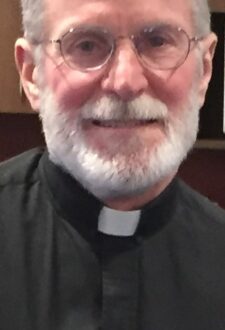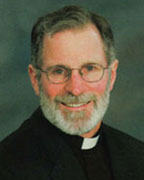Homily, September 17, 2023

From The Pastor
Mercy does not receive the value it deserves as an essential quality of human nature. Mercy is most often perceived as a religious value practiced by those who seek to live in the Divine way. It is surely that, and so much more. Mercy is a foundational characteristic of what it means to be a basic human being.
Why is mercy so critical to what it means to be human? Mercy is critical to human society, personal dignity, and the maturing of love because every human being is dependent on others. No one lives alone, separated, or isolated from the messiness of human existence. No one is perfect or self-sustaining. Everyone must live in dependent relationships of some kind with others.
When human beings live in relationships, conflict happens. Families, societies, and communities of any kind cannot successfully exist without a mature capacity for tolerance and forgiveness grounded in mercy. The greater the capacity for forgiveness built on mercy in any community, the greater their maturity and success will be. People will be happier, there will be greater peace, and more secure justice. People will be more aware and attentive to the realities of God. Mercy is not only for those who seek to measure their lives in religious virtue. Mercy is lifegiving for all because it makes evident the nature and reality of God.
It was Father Bohdan Kosicki, God rest his holy soul, who taught me that mercy is God’s unlimited, freely given, unconditional, unmerited forgiveness for the undeserving. God’s mercy is the justice of Divine love. When Jesus says, unless you forgive the other from your heart, nor will your heavenly Father forgive you, it does not mean God withholds forgiveness. It means the person who refuses to forgive another, refuses to accept the forgiveness God offers them. Forgiveness refused means none will be shared. To accept forgiveness is built on the necessity to forgive. You bind, you are bound. You release and you are released.
Peter’s question is a familiar one. It is common to all of us. Lord, if another offends me, how often must I forgive? Wishing to create a limit or boundary to forgiveness, Peter suggests seven times. Although the number seven is the biblical number for perfection, Jesus rejects the equation. Not seven times, but seventy-seven times. Perfection times perfection is an endless number. No end to the number of times, says the Lord.
Peter asks the wrong question. The better question is, ‘how do I learn to forgive?’ The first part of the answer to this question is to become deeply aware of how much I have been forgiven. How much mercy have I received? This is a question that leads to the necessity of mature self-awareness and honesty of how often I offend God or others. How deeply am I aware of my need to receive mercy and the freedom that mercy will give? To receive mercy teaches one to share mercy.
The second answer to the question challenges a person in how they care for and love others. A less mature or a selfish person might be confused by this question and its answer. A self-centered person will be less aware, even unconcerned about the needs of others or the harm done to them.
A God-centered person will understand and accept the challenges of forgiveness in the desire to live a life grounded in love. It may be considered this way: I forgive to sustain a loving heart. I forgive others in the awareness of my need and desire to be forgiven. I forgive in the desire I have for a mature and living relationship with Jesus. I forgive so that my love for God is consistent with my concern and desire to love others. I forgive others that I may be at peace with myself, not carrying burdens that only hinder my desire for love. l forgive because I want to be forgiven. In forgiveness I become more deeply aware of God’s presence to me. In God’s presence I have a greater confidence and strength to forgive myself.
Mercy is expressed through forgiveness. Mercy reveals the fabric of a person, a culture, and a society. Without mercy society falls to the lowest common denominator of violence built on judgement, control, power, and competition. A subtle but very real consciousness becomes: ‘get the other before they get you.’
This is the disposition of the first reading. ‘Wrath and anger are hateful things, yet the sinner hugs them tight.’ Too many people in our culture live this way, unaware that they are holding such a stance. It can grow slowly in a hidden way, but before long mercy becomes a lost way of being. Inner peace is lost and life can become a fearful game of competition to get the other before you get got.
Lord Jesus, open our eyes and soften our hearts to the power and love of your Divine Mercy. Your mercy is our only hope and our deepest need. Secure in the grace of your forgiveness prepare us to mercifully forgive each other.
Father John Esper
Recent Sermons

Homily, Ascension of the Lord Jesus
May 13, 2024

Homily, May 5, 2024
May 02, 2024

Homily, April 28, 2024
April 23, 2024

